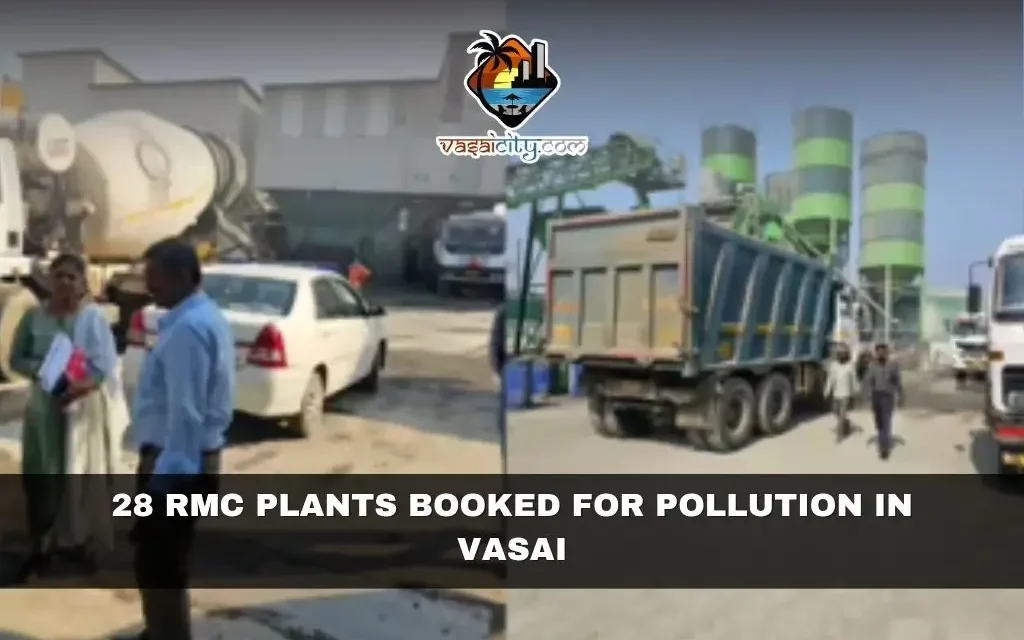In a startling development from Vasai, revenue officials have taken an unusual step by filing a First Information Report (FIR) against 28 ready-mix cement (RMC) and asphalt (dambur) plants for environmental violations. The plants were allegedly operating without necessary permissions, discharging waste into local water bodies, and worsening air quality — all without any intervention from the Maharashtra Pollution Control Board (MPCB), the designated authority for environmental regulation.
The FIR was officially registered at Naigaon Police Station on May 7, 2025. While it was expected that MPCB would take the lead in dealing with pollution-related matters, the responsibility was instead shouldered by local revenue officials, leaving many residents and activists questioning the role and efficiency of the pollution board.
Illegal Operations and Environmental Damage
The complaints were initiated after revenue officials received numerous reports from locals in Vasai Taluka about pollution caused by these plants. Acting on the direction of Tehsildar Avinash Koshti, a team led by Talathi (revenue officer) Sushil Morale conducted a field survey on April 22, 2025, in two villages — Sasunavghar and Maljipada.
The survey revealed a grim situation. Not only were these 28 RMC and dambur units operating illegally, but they also lacked documentation from regulatory authorities. Officials gave the plant owners a two-week deadline to submit relevant legal permissions and licenses. When no documents were furnished, the team decided to file a formal FIR.
“The effluents from these plants are directly discharged into nearby streams and ponds,” said Morale. “These water bodies are regularly used by locals, and the contamination is making them unsafe for daily use. It’s a serious public health concern.”
Traffic and Safety Violations
Environmental damage isn’t the only issue at stake. The FIR also outlines how trucks belonging to these RMC plants frequently violate traffic rules. They are regularly seen driving on the wrong side of the Mumbai-Ahmedabad National Highway (NH48), often during peak hours and late at night, raising questions about enforcement by the Mira-Bhayandar-Vasai-Virar (MBVV) police and highway patrol units.
Residents have complained that these trucks pose constant danger to pedestrians, cyclists, and other motorists. Yet, little has been done to address these concerns from a traffic management perspective.
FIR Filed Under Multiple Charges
The FIR has been filed under several sections of the Bharatiya Nyaya Sanhita (BNS):
- Section 223: Disobedience to orders issued by public servants
- Section 270: Public nuisance
- Section 279: Offences related to contamination of public water sources
These sections reflect both the environmental and civil dangers posed by the unauthorized operations of the plants.
MPCB’s Role Questioned
What has truly stirred debate is the silence and apparent inaction from the Maharashtra Pollution Control Board. Known to be the official body responsible for overseeing pollution levels and ensuring compliance with environmental laws, the MPCB has come under fire from activists and residents alike.
Deepak Rao, an environmental activist based in Vasai, voiced his frustration. “This was the MPCB’s job. Why did the revenue department have to step in? What checks does the MPCB even have in place?”
Rao, who has earlier filed multiple Public Interest Litigations (PILs) to protect reclaimed water bodies and raise awareness about illegal constructions on forest land, didn’t mince his words. “The MPCB acted on just 20 RMC plants in the Mira-Bhayandar and Vasai-Virar region in the last eight months. Now compare that with 28 units booked in just one day by the revenue team — it shows the lack of seriousness from MPCB.”
In response, Kiran Hasabnis, Regional Officer of MPCB’s Thane division, stated, “We have taken action on 20 RMC plants in the past eight months. It’s an ongoing activity.” However, critics argue that the board’s response has been slow and inadequate, especially when pollution levels are rising rapidly in the Vasai region.
A Grim Reminder: Two Lives Lost
Adding to the controversy, a tragic incident earlier in May served as a reminder of the safety lapses at some of these units. Two migrant workers from Uttar Pradesh died after falling into a 30-foot-deep well at an RMC unit in Naigaon. The Naigaon police registered an accidental death report (ADR), and investigations are still underway. The incident highlights the unsafe working conditions that often exist in such unauthorized establishments.
What Happens Next?
With the FIR now filed, the plant owners have been asked to submit documents proving they have the required permissions to operate. If they fail to do so, stricter action may follow, which could include sealing of the units or demolition of unauthorized structures.
The spotlight is also firmly on the MPCB. Many now expect the board to become more proactive in monitoring pollution, conducting regular inspections, and taking prompt legal action against offenders.
Meanwhile, residents and local activists continue to stay vigilant. Many feel that it is only public pressure that has prompted action so far. There is growing demand for transparency in how pollution data is tracked and how violators are penalized.
Conclusion
The case of the 28 RMC plants in Vasai is not just a story about pollution — it is a wake-up call. It reflects deep-rooted systemic issues, from lax regulatory enforcement to blatant disregard for environmental and public safety laws.
Unless authorities like the MPCB take their responsibilities seriously and work in coordination with other departments, such incidents are likely to repeat. For now, it’s the revenue department and the public who seem to be doing the heavy lifting in the battle for a cleaner, safer Vasai.









